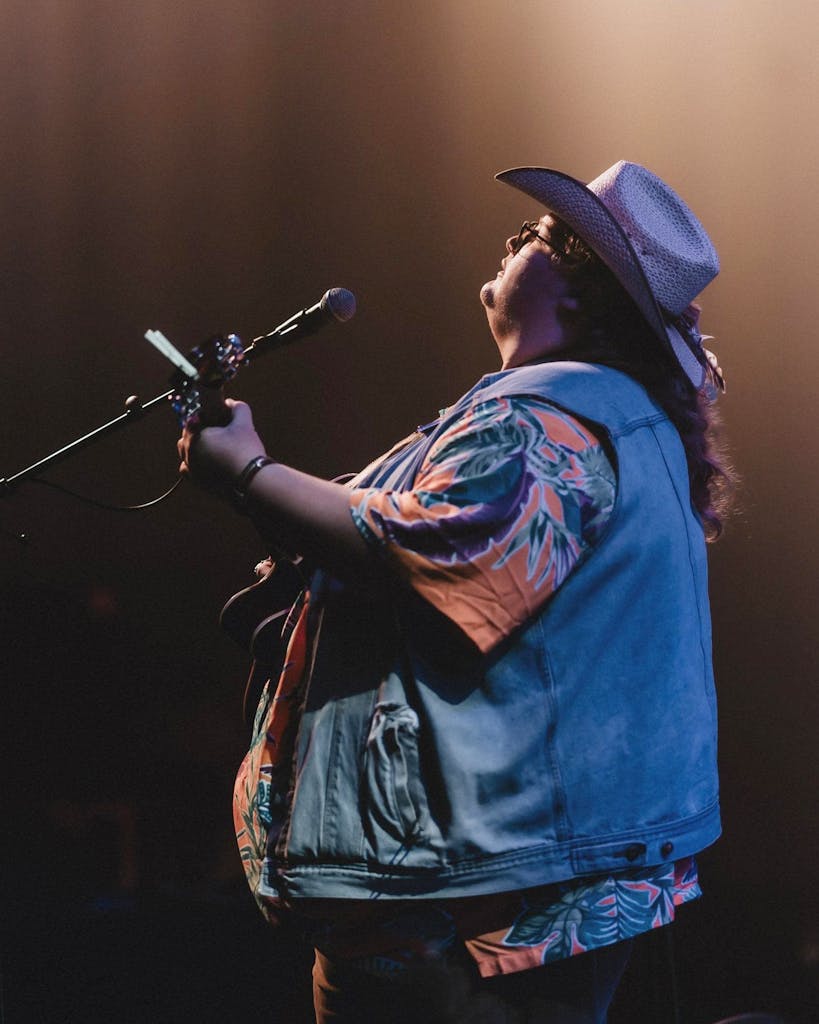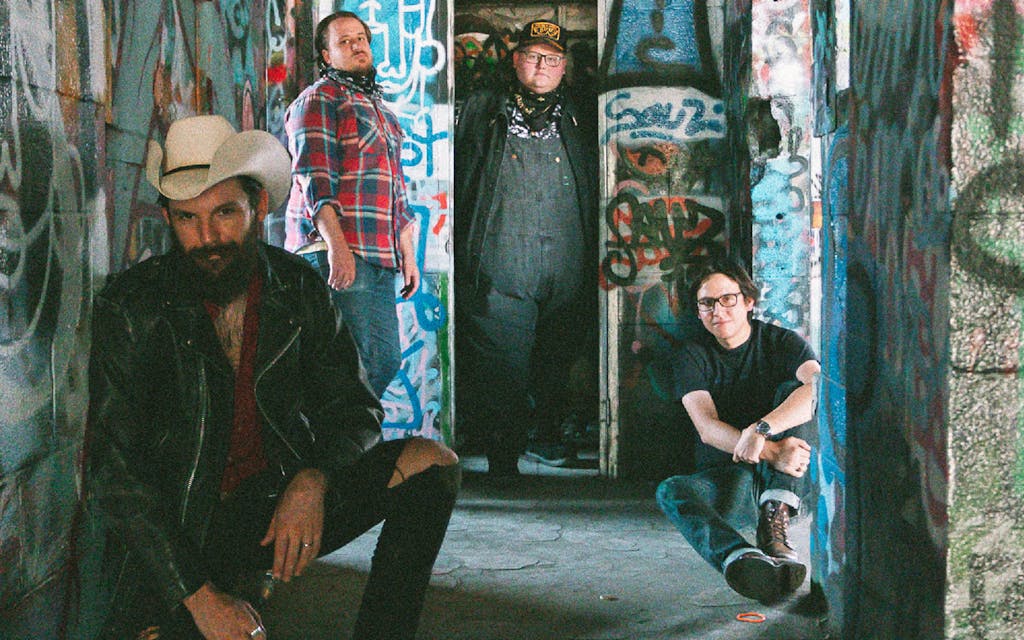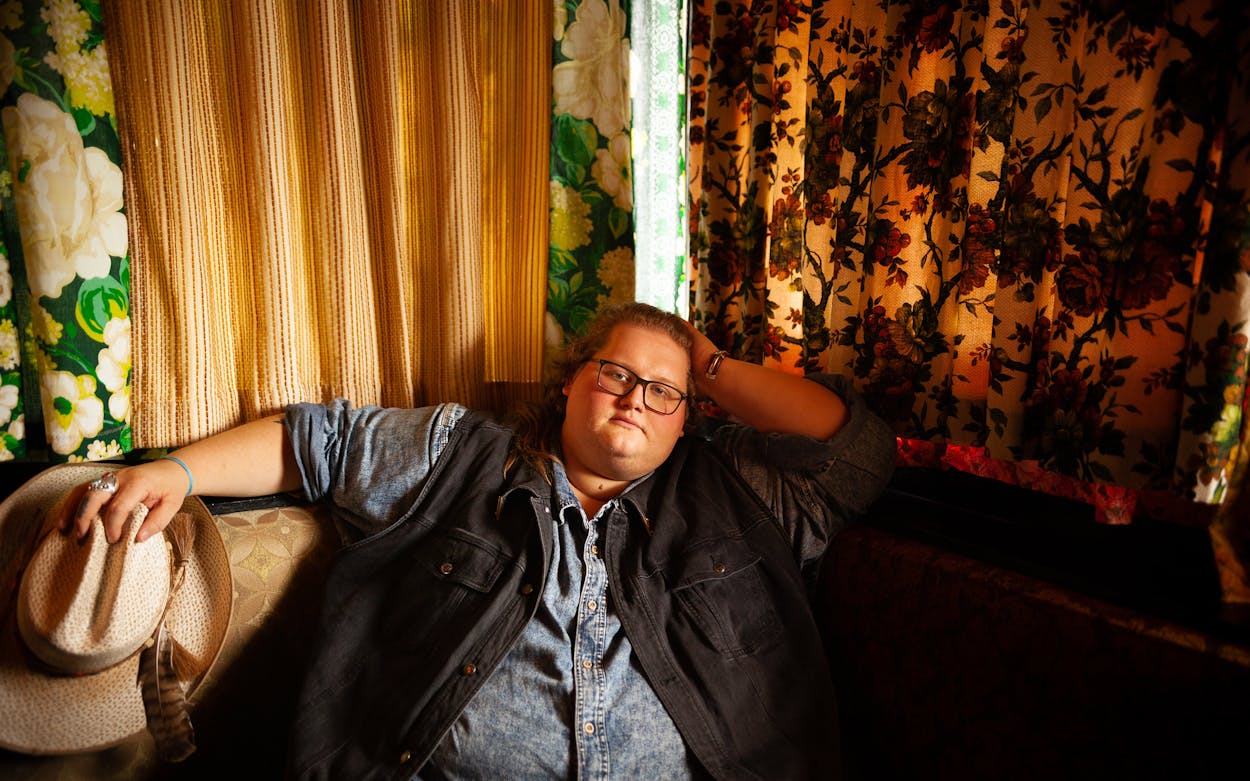Three minutes into his song “Voices,” Joshua Ray Walker summons an astonishing falsetto. As it rings out, his face contorts into a grimace, as if reaching these notes takes something out of him. Even fellow musicians aren’t always prepared for the experience of watching him perform live. “I just stood in front of the stage, let that voice wash over me, and I thought, ‘Oh my God,’ ” says Rhett Miller, lead singer of the Old 97’s, of the first time he saw the East Dallas native.
Walker’s pained expression fits the song’s lyrics: the narrator describes finishing off a bottle before driving his truck into a lake “so it looks like a mistake.” The thirty-year-old artist, who has struggled with depression for most of his life, describes the darkness in “Voices” as something “you talk about late at night on a back porch, when it’s just you and your friend, after a party has died down.”
Walker’s appearance—he typically dons a cowboy hat above his baby face and a floral shirt over his large figure—belies the torment that typifies his songwriting style. So, at times, do his melodies. Over a chipper rhythm guitar that would suit a summer backyard get-together, Walker sings a lilting ballad about a “working girl” who’s been providing for her family since the age of thirteen: “A hard living sure ain’t easy / Easy living’s even harder / So please just come and take me / I don’t want to be a martyr.” In another song, a riotous brass section backs up Walker as he bellows with joy—so much joy that the listener might not notice that he’s relating the story of an addict rationalizing his decision to relapse: “I think I’m gonna use again and it’s gonna be just fine . . . / Some say I’m addicted, but what do they know? / It’s not a struggle if you don’t fight.”
Over and over, Walker will have you laughing at a funny turn of phrase before you realize he’s singing about poverty, heartbreak, or suicidal ideation. He grew up in and around those conditions in a working-class neighborhood, where he was surrounded by the kinds of characters he sings about—sex workers, gamblers, alcoholics, boisterous liars.
“I definitely seek out the dirty corners of East Dallas where you can still find people smoking inside,” Walker says, “with the video poker machine, where they’ll actually pay you out in the bar.”
His music plunges you into the sticky shadows of those corners, of those dives. He beckons you to pull up a stool and listen as he tells you about a boat-show model, and you chuckle when he says she’s on display “like a redneck Statue of Liberty.” But then he mentions, almost offhand, that her “fake tan covers bruises / But it doesn’t last that long.”
Walker doesn’t have to go far to find those places. He still lives in East Dallas’s Casa Linda neighborhood, in the duplex where he grew up (he recently paid off the mortgage) and where he first learned music.
Walker’s grandfather, who occupied the other unit of the duplex, was a junk collector who could fix up anything to sell. He was also a bluegrass enthusiast from Tennessee, and he taught the young Walker the foundational chords of the style. By age four, Walker was playing the tenor banjo. Two years later, he was playing the guitar. He took to the instruments immediately and, from there, inhaled his grandfather’s record collection, teaching himself riffs by ear.
At the time, Casa Linda was predominantly Hispanic. Walker often heard the trumpets and accordions of tejano music blaring from backyards as he rode his bike around the streets. Before he even hit puberty, he was dabbling in genres from bluegrass to flamenco and Spanish classical. At age eleven, he got an electric guitar and tried his hand at Texas blues, mimicking Stevie Ray Vaughan licks. By middle school, he was out playing shows in Deep Ellum. The White Stripes’ 2003 album Elephant injected him with a potent dose of music from his own era; he often played along to it. That record had music that was “all my teenage angst personified,” he says.

The Great Recession hit as Walker dropped out of Bryan Adams High School, his fourth high school in four years; he moved around a lot because he was routinely the victim of bullying. He remembers seeing many middle-aged Dallasites lose their stable jobs and take minimum-wage positions at grocery stores or fast-food joints. “I grew up in a pretty low-income area, to a low-income family, but I’d seen enough people with money to watch what the recession did to people,” Walker said. “I think as an eighteen-year-old I was like, ‘I either want to be a rich man, or I want to have nothing.’ ”
For most of his twenties, he fell into the latter category. Walker didn’t have a mailing address for almost seven years after he left high school and mostly lived out of his car or couch-surfed. He played in rock and country bands around Dallas and toured the college-campus circuit. He worked as a barback or manned the door at the spots where he performed, always willing to stick around for an extra night. “I wanted to know every part of the music business,” he says. “What I accidentally ended up learning was the bar business.”
During those years, Walker found himself in bars until closing time about six nights a week, but he contends that he didn’t drink more than your average college student. “If I was addicted to anything, it was social interaction, because I was scared to be alone,” he admits.
A man of Walker’s stature and colorful style posted up in a dive tends to invite attention and thus an opening for conversation. Eventually, the characters who sat a bar stool or two away from him started to become the protagonists of his songs. “I like the people you meet at dive bars,” Walker says. “I like learning their stories. I like that little spark you get when you’re getting to know someone for the first time.”
For years, night after night, before and after his gigs, under dim lights hanging from smoke-stained ceilings, nursing a glass of beer with a tumbler of whiskey nearby, Walker worked his sources: the unlucky, the heartbroken, the rolling stones, the ones who, as in one of his songs, “have been workin’ on work” and whose “pale hands ain’t seen light for days.” Which was, really, about himself: in 2017, for example, Walker played 287 shows. By the end of that year, he’d still never been on an airplane, but he was grinding out gigs and converting fans one bar at a time.
During those years he also made room to display a lighter side of himself as a guitarist for the Ottoman Turks, a fast, loud, irreverent band led by his childhood friend Nathan “Mongol” Wells. “The whole point of Ottoman Turks is to get people to drink,” Walker explains. “We were a great weekend bar band. We’d make our name doing that, and I’d play residencies during the week as a songwriter.”
Those residencies took place in the types of bars where patrons were more concerned with the price of well liquor than with anyone’s musical ambitions. Walker’s guitar playing had to get people to look up from their drinks. His voice had to be loud and its range impressive. His songs had to be compelling enough to hush the loudest boors. Eventually, he checked all of those boxes.
It was through the Ottoman Turks that Walker connected with John Pedigo, a veteran Dallas musician and producer. Pedigo invited Walker to his studio in late 2017 to play some solo songs. When Walker sang “Canyon,” a raw, emotional number that directly addresses his father, who had been diagnosed with lung cancer the previous year (he died in 2020), Pedigo immediately told Walker that, one way or another, they’d make an album together.
In 2019 they released Walker’s debut, Wish You Were Here. Pedigo also produced Walker’s 2020 follow-up, Glad You Made It. The former is a compendium of stories and characters Walker encountered during his years of work and struggle. Each song makes you feel as though you’re meeting another troubled patron at the dive pictured on the album cover, where Walker, beer in hand, looks out at you as if waiting to hear your story. Glad You Made It tells more stories but with the addition of experimental tracks, including “D. B. Cooper,” and “Voices,” Walker’s most popular song to date.
If Wish You Were Here was quietly well received by national critics and introduced Walker to people outside Dallas, Glad You Made It put him on the sorts of Spotify playlists that earned him fans much faster than his one-bar-at-a-time approach had. Rolling Stone deemed him one of country music’s “most fascinating young songwriters.”

But all this hasn’t added up to a whole lot financially for Walker, who’d planned a tour in 2020 that was canceled as a result of COVID-19. “I would have had a massive year,” he says, noting that he was booked for more than fifty international shows, as well as a U.S. circuit and a South by Southwest appearance. Instead, he spent that year writing a third album, which should be released later in 2021.
That record will come after many months of isolation, away from those souls who have inspired many of his lyrics. Will this result in a different approach to his songs? His most recent single—a cover of Lionel Richie’s “Hello”—suggests it might. But the people he writes about are among those who were hit especially hard by the pandemic. Even if he hasn’t seen much of them over the past year, he understands their anxieties, and he’s already been putting their anguish into his music.
Walker knows he’s earned his place in the spotlight by living among his audience, whose members see as much of themselves in him as he sees of himself in them. From a listener’s perspective, the people Walker met in those dark corners became the subjects of his songs. But from his subjects’ perspective, Walker was one of them too. He was the one with the guitar and the voice that delighted and consoled.
As the pandemic subsides, Walker has resumed playing in dives and honky-tonks across the state. If you want to find him, really find him, he’ll be in those places long after he’s sung his last note of the evening, after the final patrons have drained their glasses and slapped his back and stumbled out into the warm night, smiling to themselves. He’ll be the last one left, waiting quietly for the tired bartender to finish wiping down so he can ask her about the characters she’s met.
Jonny Auping is a freelance writer based in Dallas. His work has appeared in the Dallas Morning News, the New Yorker, and D Magazine.
This article appeared in the July 2021 issue of Texas Monthly with the headline “Darkness Visible in Dallas.” Subscribe today.
- More About:
- Music
- Country Music
- Dallas







